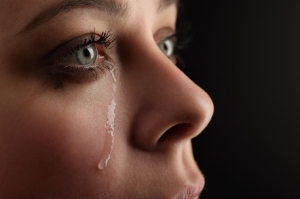
“A diagnosis is burden enough without being burdened by secrecy and shame.” Jane Pauley (Image from iStock)
Our phone conversation left me teary. Our daughter said the news about Robin Williams’ suicide scared her. It made her think of me. Her comparison was disturbing, and oddly comforting. If I could choose an actor to be like, it’d be him.
In the aftermath of his death, Robin’s family, friends, and colleagues confirmed his kindness over and over by posting on Twitter things like, “A gentle spirit,” “Nicest guy I’ve ever worked with,” and “Robin had time for everyone.”
His roles in movies like Mrs. Doubtfire and Dead Poets Society were too convincing to be called “acting.” So was his performance during Good Will Hunting when he compellingly repeated to Matt Damon, “It’s not your fault.” (It’s a powerful clip if you can get past the language. I could.)
I went back several times to the theater with a handful of tissue to hear him tell me that same thing, “It’s not your fault.” I’d sit alone on the back row during afternoon matinees and sob. I’ve since watched the scene on my laptop hundreds of times.
Even though I knew why my daughter was afraid (she knows I mask pain with humor), Robin Williams’ death isn’t the one that terrified me. It was Harriet Deison’s suicide that kept me awake at nights.
After reading every article I could find on her, I’d imagine talking her out of driving across town in her Lexus to a gun shop where she shot herself inside her car. I’d imagine our conversations about hiding how we felt so others would think we were okay because we wanted desperately to be okay. I’d imagine helping each other step outside our depression and into the Light. I still wonder why this beautiful 65-year-old woman, a preacher’s wife at a prominent church in Texas, committed suicide four days after Christmas. I wonder why her husband, her daughters, and her grandchildren weren’t enough to help her choose life.
But, then, I think maybe I know.
My husband and I call it “The Dark Place.” It’s where I’m convinced family and friends don’t want to hear about my despair, but I’m desperate to talk about it. It’s where I beg God to show up, but he’s quiet, almost like he was never there at all. It’s the place where I’m overcome by pain, yet the pain of suicide seems practical and peaceful. The dark place is not just my closet where I curl up, it’s the thoughts I curl up with … the ones that say, “It is your fault.”
Until the movie Good Will Hunting, I couldn’t put into words what was wrong. The “it” (that I didn’t want to be my fault) was not being able to fix or fit into my family of origin. The “it” was not feeling safe and protected because I wasn’t. The “it” was having emotions that overwhelmed my family and me because none of us wanted to face what had happened and what was still happening.
The scariest part, even when it hurt, was I couldn’t stop living up to my title from high school as “Most Dependable.” I took responsibility for my family’s insanity because they wouldn’t. I also kept it a secret because maybe they were right, maybe it was my fault.
After Mom threatened me with boarding school because “all you do is cry,” I tried to stop feeling and talking about my depression and fear. I tried to stop making a big deal out of nothing (like sexual abuse) and taking things personally (like Dad staying away nine months out of the year). I tried to convince myself it was safe to love and lighten up even when my uncle who abused me ended up in a padded room at a mental hospital. But I couldn’t do it. Death sounded safer than life and suicide seemed the only way out since I told myself I was too unstable to leave.
Get over it. Yeah, I tried that too.
Here’s where I’m supposed to neaten up my blog post, let you know God’s the answer (he is, but I’m not preaching because talking-tos didn’t help me), and tell how I stopped wanting to kill myself. Like my daughter says about solutions, “I’m not quite there yet, but I’m working on it.”
I can offer some hope, though. Robin Williams and Harriet Deison saved me a little bit. My kids, my husband, my friends, and even my family of origin saved me a little bit. Most importantly, I’m saving myself a little bit by writing blog posts like this one. I hope if you’re in a scary place, this blog post saves you a little bit.
“Writing is a struggle against silence.” Carlos Fuentes
Is there something you need to share or something you need to do to save yourself? If so, it may save others a little bit as well.
WRite wHere I’m supposed to be – To heal, we must allow ourselves to feel. And some of us also need to talk about the feelings even if others don’t want to hear them. And this, my reader friends, is why I write. Thanks for letting me talk.
Click the link for an inspiring article and video sent by my daughter right after Robin Williams’ suicide. Going Public with Depression is by CNN’s Kat Kinsman.
Click the link to read the obituary of Harriet Deison.
Click the link to read a compassionate account by Steve Blow of Harriet Deison’s life and death: For Harriet Deison, a life to admire gave way to a death beyond understanding